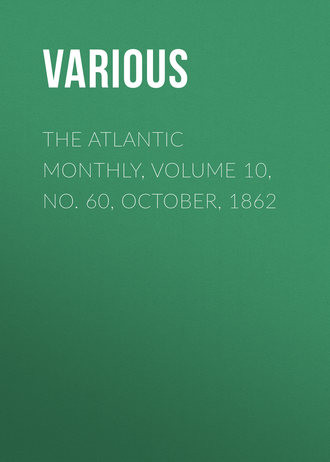 полная версия
полная версияThe Atlantic Monthly, Volume 10, No. 60, October, 1862

TABLE II.–BATTLES BETWEEN FLEETS OR SQUADRONS BRITISH.
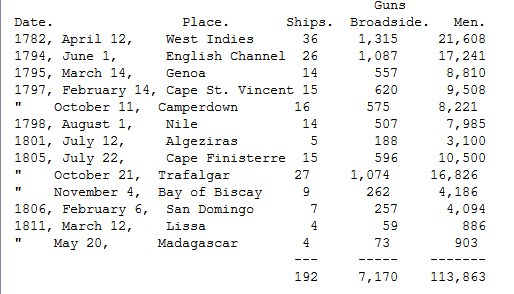
TABLE II.–BATTLES BETWEEN FLEETS OR SQUADRONS (cont.)
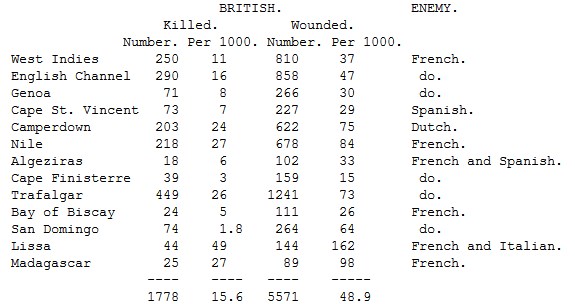
TABLE III.–BATTLES BETWEEN BRITISH AND AMERICAN SHIPS.
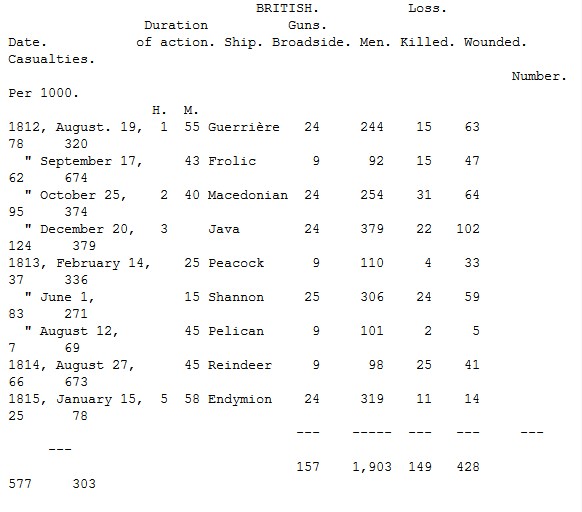
TABLE III.–BATTLES BETWEEN BRITISH AND AMERICAN SHIPS. (cont.)
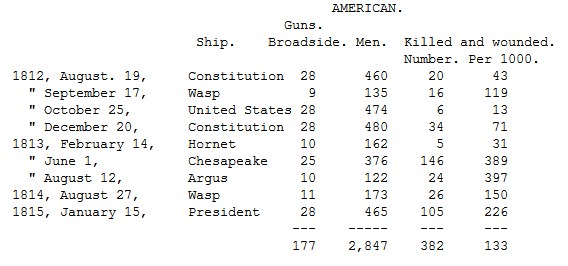
Mr. Hodge's second table shows the conditions and casualties of thirteen battles between fleets and squadrons. This is condensed and quoted on the preceding page.
His third table includes thirty-five actions with single ships on each side, between the years 1793 and 1815. 8,542 men were engaged, and 483, or 56.5 per 1,000, were killed, and 1,230, or 144 per 1,000, wounded.
Twenty-six of these actions were with French ships, which are here omitted, and nine with American ships, which are shown in the second table on the preceding page.
There is a very remarkable difference in the loss which the British suffered in naval and in land battles:—

The danger both of wounds and death in these contests was three times as great in the single ships as in fleets, and about five times as great in battles with the Americans as in fleet-battles with other nations. The dangers in fleet-battles were about half as great as those in land-battles, and these were but little more than half as great as those in fights with single ships.
COMPARATIVE DANGER OF CAMP AND BATTLE-FIELD
These records of land-battles show that the dangers from that cause are not very great; probably they are less than the world imagines; certainly they are much less than those of the camp. Of the 176,007 admitted into the regimental hospitals during the Peninsular War, only 20,886 were from wounds, the rest from diseases; fourteen-fifteenths of the burden on the hospitals in that war, through forty-two months, were diseased patients, and only one-fifteenth were wounded. In the Crimean War, 11.2 per cent. in the hospitals suffered from injuries in battle, and 88.8 per cent. from other causes. 10 per cent. of the French patients in the same war were wounded, and 90 per cent. had fevers, etc. In the autumn of 1814, there were 815 patients in the great military hospital at Burlington, Vermont. Of these 50 were wounded, and the rest had the diseases of the camp.
In the Crimean War, 16,296 died from disease, and 4,774 from injuries received in battle. In the Peninsular War, 25,304 died of disease, and 9,450 from wounds.
During eighteen years, 1840 to 1857, 19,504 were discharged from the home, and 21,325 from the foreign stations of the British army. Of these, 541, or 2.7 per cent. of those at home, and 3,708, or 17.3 per cent. abroad, were on account of wounds and fractures, and the others on account of disease, debility, and exhaustion.
NATIONS DO NOT LEARN FROM EXPERIENCE TO PREPARE FOR ARMY-SICKNESS
Nations, when they go to war, prepare to inflict injury and death on their opponents, and make up their minds to receive the same in return; but they seem neither to look nor to prepare for sickness and death in their camps. And when these come upon their armies, they seem either to shut their eyes to the facts, or submit to the loss as to a disturbance in Nature, a storm, a drought, or an earthquake, which they can neither prevent nor provide for, and for which they feel no responsibility, but only hope that it will not happen again. Nevertheless, this waste of life has followed every army which has been made to violate the laws of health, in privations, exposures, and hardships, and whose internal history is known. The experience of such disastrous campaigns ought to induce Governments to inquire into the causes of the suffering and loss, and to learn whether they are not engaged in a struggle against Nature, in which they must certainly fail, and endeavoring to make the human body bear burdens and labors which are beyond its strength. But Governments are slow to learn, especially sanitary lessons. The British army suffered and died in great numbers at Walcheren and South Beveland, in the middle of the last century. Pringle described the sad condition of those troops, and warned his nation against a similar exposure; yet, sixty years later, the Ministry sent another army to the same place, to sink under the malarious influences and diseases in the same way. The English troops at Jamaica were stationed in the low grounds, where, "for many generations," "the average annual mortality was 13 per cent." "A recommendation for their removal from the plains to the mountains was made so far back as 1791. Numerous reports were sent to the Government, advising that a higher situation should be selected"; but it was not until 1837, after nearly half a century of experience and warning, that the Ministry opened their eyes to this cost of life and money in excessive sickness and mortality, and then removed the garrison to Maroontown, where the death-rate fell to 2 per cent., or less than one-sixth of what it had been50.
The American army, in the war with Great Britain fifty years ago, suffered from the want of proper provision for their necessities and comfort, from exposures and hardships, so that sometimes half its force was unavailable; yet, at the present moment, a monstrous army is collected and sent to the field, under the same regulations, and with the same idea of man's indefinite power of endurance, and the responsibility and superintendence of their health is left, in large measure, to an accidental and outside body of men, the Sanitary Commission, which, although an institution of great heart and energy, and supported by the sympathies and cooperation of the whole people, is yet doing a work that ought to be done by the Government, and carrying out a plan of operations that should be inseparably associated with the original creation of the army and the whole management of the war.
CRIMEAN WAR
The lesson which the experience of the Russian army of 1828 and 1829 taught the world of the mortal dangers of Bulgaria was lost on the British Government, which sent its own troops there in 1854, to be exposed to, and wither before, the same destructive influences. But at length sickness prevailed to such an extent, and death made such havoc, in the army in the East, that England's great sympathies were roused, and the Ministers' attention was drawn to the irresistible fact, that the strongest of Britain's soldiers were passing rapidly from the camp to the hospital, and from the hospital to the grave. Then a doubt occurred to the minds of the men in power, whether all was right in the Crimea, and whether something might not be done for the sanitary salvation of the army. They sent a commission, consisting of Dr. John Sutherland, one of the ablest sanitarians of the kingdom, Dr. Hector Gavin, and Robert Rawlinson, civil engineer, to the Black Sea, to inquire into the state of things there, to search out the causes of the sufferings of the army, and see if there might not be a remedy found and applied. At the same time, Miss Nightingale and a large corps of assistants, attendants, and nurses, women of station and culture and women of hire, went to that terrible scene of misery and death, to aid in any measures that might be devised to alleviate the condition of the men. Great abuses and negligence were found; and the causes of disease were manifest, manifold, and needless. But a reform was at once instituted; great changes were made in the general management of the camp and hospitals and in the condition of the soldiers. Disease began to diminish, the progress of mortality was arrested, and in the course of a few months the rate of death was as low as among men of the same ages at home.
This commission made a full report, when they returned, and described the state of things they found in the Crimea and on the shores of the Black Sea,—the camps, barracks, huts, tents, food, manner of life, and general sanitary condition of the troops, their terrible sufferings, and the means and ways of caring for the sick, the measures of reform which they had proposed and carried out, and their effects on the health of the men. This report was published by the Government.
Besides this commission, the Government sent Dr. Lyons, a surgeon and pathologist of great learning and acumen, to investigate the pathology or morbid condition of the army. According to his instructions, he spent four months in the Crimea and at the great hospitals on the Bosphorus. He examined and traced the course of disease and disturbance in the sick and wounded. He made very many thorough examinations after death, in order to determine the effects of vitiating influences upon the organization, and the condition of the textures and organs of the body in connection with the several kinds of disorders. Dr. Lyons's extremely instructive report was published by national authority as one of the Parliamentary folio volumes. After the war was over, Dr. W. Hanbury and Staff-Surgeon Matthew, under the direction of the Secretary of War, gathered, analyzed, and prepared the records of all the surgeons of the several corps of the Crimean army. To these they added a long and valuable treatise on the nature and character of the diseases, and their connection with the condition and habits of the men. These are published in two very thick folio volumes, and give a minute and almost daily history of the life, labors, exposures, privations, sufferings, sickness, and mortality of each regiment. These two works, of Dr. Lyons and Drs. Hanbury and Matthew, show the inseparable connection between the manner of living and the health, and demonstrate that the severe life of war, with its diminished creation of vital force, by imperfect and uncertain nutrition and excessive expenditure in exposures and labors, necessarily breaks down the constitution. It subjects the body to more abundant disorders, and especially to those of the depressive, adynamic type, which, from the want of the usual recuperative power, are more fatal than the diseases of civil life. These works may be considered generic as well as specific. They apply to and describe the sanitary condition and the pathological history of all armies engaged in hard and severe campaigns, as well as those of the Crimea. They should, therefore, be read by every Government that engages in or is forced into any war. They should be distributed to and thoroughly understood by every commander who directs the army, and every surgeon who superintends the sanitary condition of, and manages the sickness among, the men; and happy will it be for those soldiers whose military and sanitary directors avail themselves of the instructions contained in these volumes.
There are several other works on the Crimean War, by surgeons and other officers, written mainly to give a knowledge of the general facts of those campaigns, but all incidentally corroborating and explaining the statements in the Government Reports, in respect to the health and sufferings of the British and French armies. In this view, Dr. Bryce's book, "England and France before Sebastopol," and M. Baudens's and M. Scrive's medical works in French, are worthy of great attention and confidence.
The most important and valuable work, in this connection, is the Report of the British Commission appointed in May, 1854, "to inquire into the regulations affecting the sanitary condition of the British army, the organization of the military hospitals, and the treatment of the sick and wounded." This commission included some of the ablest and most learned physicians and surgeons in the civil and military service, some of the most accomplished statisticians, sanitarians, army-officers, and statesmen in the United Kingdom. They were authorized to inquire into the habits and duties, the moral and sanitary condition of the army, the amount and kinds of sickness, the causes and frequency of death, and the means of improvement. This commission sat for a long time in London. They called before them fifty-three witnesses, among whom were Sir Benjamin Brodie, the leading surgeon of England, Dr. Andrew Smith, Director-General of the Medical Department of the Army, Thomas Alexander, Inspector-General of Hospitals, Major-General Airey, Quartermaster-General, Dr. John Sutherland, late Crimean Commissioner, and one of the leading authorities of Great Britain in all sanitary matters, Dr. William Fair, the chief and master-spirit of the Registry-Office, and the highest authority in vital statistics, Colonel Sir Alexander Tulloch, author of the elaborate and valuable reports on the mortality in the British army, Francis G. P. Neison, author of "Contributions to Vital Statistics," Miss Nightingale, and others, surgeons, officers, purveyors, engineers, soldiers, and medical and sanitary scholars.
The commission put forth 10,070 interrogatories relating to everything connected with the army, the persons and the matériel, to officers, surgeons, physicians, health-officers, soldiers, nurses, cooks, clothing, food, cooking, barracks, tents, huts, hospitals, duties, labors, exposures, and privations, and their effects on health and life, in every climate, wherever British troops are stationed or serve, at home and abroad. The same inquiry was extended to the armies of other nations, French, Turkish, Russian, etc. To these questions the witnesses returned answers, and statements of facts and opinions, all carefully prepared, and some of great length, and elaborate calculations in respect to the whole military and sanitary science and practice of the age. A large part of the inquiry was directed to the Crimean army, whose condition had been, and was then, a matter of the most intense interest. Many of the witnesses had, in various ways, been connected with that war: they were familiar with its history, and their answers revealed much that had not before been known. The result of all this investigation is published in a folio volume of 607 pages, filled with facts and principles, the lamentable history of the past, painful descriptions of the present, and wise suggestions for the future management of the army; and the whole is worthy of the careful attention of all who, as projectors, leaders, or followers, have anything to do with the active operations of war.
The Crimean War has this remarkable interest, not that the suffering of the troops and their depreciation in effective power were greater than in many other wars, but that these happened in an age when the intelligence and philanthropy, and even the policy of the nation, demanded to know whether the vital depression and the loss of martial strength were as great as rumor reported, whether these were the necessary condition of war, and whether anything could be done to lessen them. By the investigations and reports of commissions, officers, and others, the internal history of this war is more completely revealed and better known than that of any other on record. It is placed on a hill, in the sight of all nations and governments, for their observation and warning, to be faithful to the laws of health in providing for, and in the use of, their armies, if they would obtain the most efficient service from them.
WANT OF SANITARY PREPARATIONS FOR WAR
There are, and have been, faults—grievous, destructive, and costly faults—in all connected with armies, from the Governments at the head, down through all grades of officers, to the men in the ranks: they are faults of theory and faults of practice,—of plan in those who direct, and of self-management in those whose whole duty is to obey. The root of this is the failure to fully understand and count the cost, and to prepare to meet it as men generally do in the management of their common affairs. In civil life, when prudent men intend to effect any purpose by the aid of motive power, whether of water, steam, horse, or other kind, they carefully consider the means of generating that power, and the best and safest ways of applying and expending it. They include this in their plans, and make provision accordingly. Precisely determining the extent of the purpose they design to effect, and the amount of force that is and will be needed, they make their arrangements to provide or generate and maintain so much as long as they intend to do the work. During the whole process, they carefully guard and treasure it up and allow none to be wasted or applied to any other than the appointed purpose. But in the use and management of the vital machines, the human bodies, by which the purposes of war are to be accomplished, nations are less wise. There are few, perhaps no records of any Government, which, in creating, maintaining and operating with an army, has, at and during the same time, created and established the never-failing means of keeping the machinery of war in the best working order, by sustaining the health and force of the men in unfailing fulness.
War is carried on by a partnership between the Government and soldiers, to which the Government contributes money and directing skill, and assumes the responsibility of management, and the soldiers contribute their vital force. In the operation of this joint concern, both the money of the nation and the lives of the men are put at risk. Although, by the terms of the contract, the Government is presumed to expend its money and the soldiers' vital force to the extent that may be necessary to effect the objects of the association, it has no right to do this for any other purpose or on any other condition. It may send the men to battle, where they may lose in wounds or in death a part or all that they have contributed; but it has no right, by any negligence or folly on its own part or in its agents, to expend any of the soldiers' health or strength in hunger, nakedness, foul air, miasma, or disease. There is a received glory attached to wounds, and even to death, received in a struggle with the enemies of one's country, and this is offered as a part of the compensation to the warrior for the risk that he runs; but there is no glory in sickness or death from typhus, cholera, or dysentery, and no compensation of this kind comes to those who suffer or perish from these, in camp or military hospital.
DIFFERENCE BETWEEN CIVIL AND MILITARY LIFE
Military life, with the labors, exposures, and circumstances of war, differs widely from civil life. The social and domestic machinery of home spontaneously brings within the reach of families the things that are needful for their sustenance, comfortable for their enjoyment, and favorable to their health. But this self-acting machinery follows not the soldier through his campaigns. Everything he needs or enjoys is to be a matter of special thought, and obtained with a special effort and often with difficulty. Much that was very comfortable and salutary in civil life must be given up in the camp. The government is the purveyor for and the manager of the army; it undertakes to provide and care for, to sustain and nourish the men. But, with all its wisdom, power, and means, it is not equal to the thousand or thousands of housekeepers that cared and provided for these men when at home; and certainly it does not, and probably cannot, perform these domestic offices as well and as profitably for the soldiers as their natural providers did. Nevertheless, the Government is the sole provider for the army, and assumes the main responsibility of the physical condition of its members.
Starting with the very common belief that the human body has an indefinite power of endurance, or, if it suffer from disease, or fall in death, it is from causes beyond man's control,—seeing, also, that it is impossible to carry the common means of sustaining life into the camp, Governments seem willing to try the experiment of requiring their men to do the hard work of war without a certain, full supply of sustenance. They expect from the army the largest expenditure of force, but sometimes give it the smallest means and poorest conditions of recuperating it.
The business of war is not constant and permanent, like the pursuits of peace. It therefore comes to most managers as a new and unfamiliar work, to which they can bring little or no acquaintance from experience. They enter upon untried ground with imperfect knowledge of its responsibilities and dangers, and inadequate conceptions of the materials and powers with which they are to operate. They therefore make many and some very grave mistakes, every one of which, in its due proportion, is doubly paid for in drafts on the nation's treasury and on the soldiers' vital capital, neither of which is ever dishonored.
Military life is equally new to the soldier, for which none of his previous education or experience has fitted him. He has had his mother, wife, sister, or other housekeeper, trained and appointed for the purpose, to look after his nutrition, his clothing, his personal comfort, and, consequently, his health. These do not come without thought and labor. The domestic administration of the household and the care of its members require as much talent, intelligence, and discipline as any of the ordinary occupations of men. Throughout the civilized world, this responsibility and the labor necessary for its fulfilment absorb a large portion of the mental and physical power of women.
When the new recruit enters the army, he leaves all this care and protection behind, but finds no substitute, no compensation for his loss in his new position. The Government supposes either that this is all unnecessary, or that the man in arms has an inspired capacity or an instinctive aptitude for self-care as well as for labor, and that he can generate and sustain physical force as well as expend it. But he is no more fitted for this, by his previous training and habits, than his mother and wife are for making shoes or building houses by theirs. Nevertheless he is thrown upon his own resources to do what he may for himself. The army-regulations of the United States say, "Soldiers are expected to preserve, distribute, and cook their own subsistence"; and most other Governments require the same of their men. Washing, mending, sweeping, all manner of cleansing, arrangement and care of whatever pertains to clothing and housekeeping, come under the same law of prescription or necessity. The soldier must do these things, or they will be left undone. He who has never arranged, cared for, or cooked his own or any other food, who has never washed, mended, or swept, is expected to understand and required to do these for himself, or suffer the consequences of neglect.
The want of knowledge and training for these purposes makes the soldier a bad cook, as well as an indiscreet, negligent, and often a slovenly self-manager, and consequently his nutrition and his personal and domestic habits are neither so healthy nor so invigorating as those of men in civil life; and the Government neither thinks of this deficiency nor provides for it by furnishing instruction in regard to this new responsibility and these new duties, nor does it exercise a rigid watchfulness over his habits to compel them to be as good and as healthy as they may be.
MUCH SICKNESS DUE TO ERRORS OF GOVERNMENT
Whatever may be the excess of sickness and mortality among soldiers over those among civilians, it is manifest that a great portion is due to preventable causes; and it is equally manifest that a large part of these are owing to the negligence of the Government or its agents, the officers in command or the men themselves, in regard to encampments, tents, clothing, food, labors, exposures, etc.
The places of encampment are usually selected for strategic purposes, or military convenience, and the soldiers are exposed to the endemic influences, whatever they may be. In some localities these influences are perfectly salubrious; in others they are intensely destructive. Malaria and miasms offer to the unpractised eye of the military officer no perceptible signs of their presence. The camp is liable to be pitched and the men required to sleep in malarious spots, or on the damp earth, or over a wet subsoil, exposed to noisome and dangerous exhalations from which disease may arise. Pringle says, that, in 1798, the regiment which had 52 per cent, sick in two months, and 94 per cent, sick in one season, "were cantoned on marshes whence noxious exhalations emanated."51 "Another regiment encamped where meadows had been flowed all winter and just drained, and half the men became sick." Lord Wellington wrote, August 11, 1811, "Very recently, the officer commanding a brigade encamped in one of the most unwholesome situations, and every man of them is sick."52 One of our regiments encamped at Worcester, Massachusetts, on the Agricultural Society's grounds, where the upper soil was not dry and the subsoil was wet. The men slept in tents on the ground, consequently there were thirty to forty cases of disordered bowels a day. The surgeon caused the tents to be floored, and the disease was mitigated. The Eleventh Massachusetts Regiment were encamped on a wet soil at Budd's Ferry, in Maryland. In a week, thirty cases of fever appeared. Dr. Russell, the surgeon, ordered the camp to be removed to a dry field, and the tents to be floored with brush; no new cases of fever appeared afterward. Moltka says that "the Russian army which suffered so terribly and fatally in 1828 and 1829 was badly clothed and badly nourished, and in no way protected against the climate of the Danubian Provinces, and especially of Bulgaria, where the temperature varies from 58° in the day to 29° at night, and where the falling dew is like a fine and penetrating rain."53









